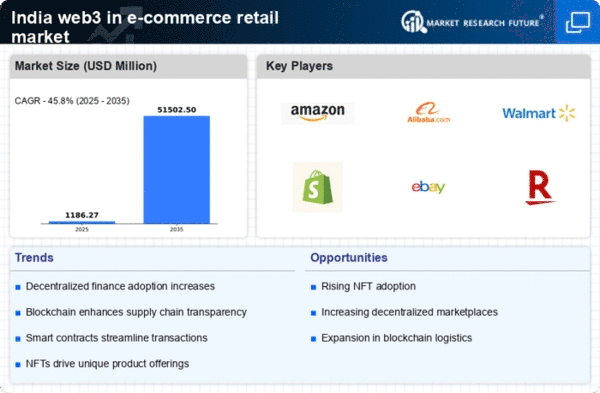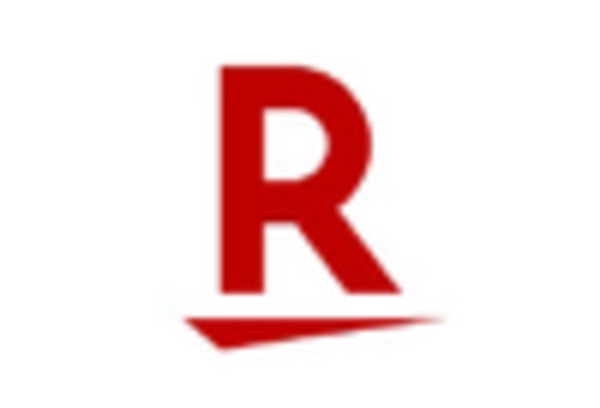Rise of Digital Wallets
The proliferation of digital wallets in India is a pivotal driver for the web3 in-e-commerce-retail market. As of November 2025, approximately 60% of Indian consumers utilize digital wallets for transactions, reflecting a shift towards cashless payments. This trend is likely to enhance the adoption of web3 technologies, as digital wallets often integrate blockchain features, providing secure and transparent transaction methods. Furthermore, the convenience of digital wallets encourages consumers to engage more frequently with e-commerce platforms, thereby increasing overall market activity. The integration of decentralized finance (DeFi) solutions within these wallets may also facilitate seamless transactions, further driving the growth of the web3 in-e-commerce-retail market. As consumers become more accustomed to digital transactions, the demand for innovative payment solutions is expected to rise, potentially leading to a more robust e-commerce ecosystem.
Adoption of Smart Contracts
The adoption of smart contracts is emerging as a transformative driver within the web3 in-e-commerce-retail market. These self-executing contracts, which are coded on blockchain platforms, facilitate automated transactions without the need for intermediaries. In India, businesses are increasingly recognizing the efficiency and cost-effectiveness of smart contracts, particularly in supply chain management and payment processing. As of November 2025, it is estimated that around 30% of e-commerce businesses are exploring or implementing smart contract solutions. This trend not only streamlines operations but also enhances security and reduces the potential for fraud. Consequently, the integration of smart contracts into e-commerce platforms is likely to bolster the growth of the web3 in-e-commerce-retail market, as companies seek to optimize their processes and improve customer experiences.
Increased Internet Penetration
India's internet penetration rate has reached approximately 70% in 2025, significantly impacting the web3 in-e-commerce-retail market. This surge in connectivity enables a larger segment of the population to access online shopping platforms, fostering a more inclusive digital economy. The rise of mobile internet users, particularly in rural areas, suggests that e-commerce is becoming increasingly accessible. As more consumers engage with online retail, the demand for web3 solutions, such as decentralized marketplaces and blockchain-based payment systems, is likely to grow. This increased accessibility may also encourage businesses to adopt web3 technologies to cater to a broader audience, thereby enhancing their competitive edge. Consequently, the web3 in-e-commerce-retail market is poised for substantial growth as internet penetration continues to expand across diverse demographics.
Consumer Demand for Transparency
There is a growing consumer demand for transparency in transactions, which serves as a crucial driver for the web3 in-e-commerce-retail market. Indian consumers are increasingly concerned about data privacy and the authenticity of products. As a result, businesses that leverage blockchain technology to provide transparent supply chains and verifiable product information are likely to gain a competitive advantage. Approximately 55% of consumers express a preference for brands that utilize blockchain for tracking product origins. This trend indicates that companies adopting web3 solutions may experience enhanced customer loyalty and trust. Furthermore, the emphasis on transparency aligns with the broader societal shift towards ethical consumption, suggesting that the web3 in-e-commerce-retail market could see accelerated growth as businesses respond to these consumer expectations.
Emergence of Decentralized Identity Solutions
the emergence of decentralized identity solutions is set to reshape the web3 in-e-commerce-retail market. As privacy concerns escalate, consumers are increasingly seeking control over their personal data. Decentralized identity systems allow users to manage their identities securely, reducing the risk of data breaches. In India, this trend is gaining traction, with an estimated 40% of consumers expressing interest in using decentralized identity solutions for online transactions. This shift not only enhances consumer trust but also encourages businesses to adopt web3 technologies to meet evolving privacy standards. As companies implement these solutions, they may experience improved customer engagement and retention, ultimately driving growth in the web3 in-e-commerce-retail market. The potential for decentralized identity to streamline user verification processes further underscores its importance in the evolving digital landscape.

















